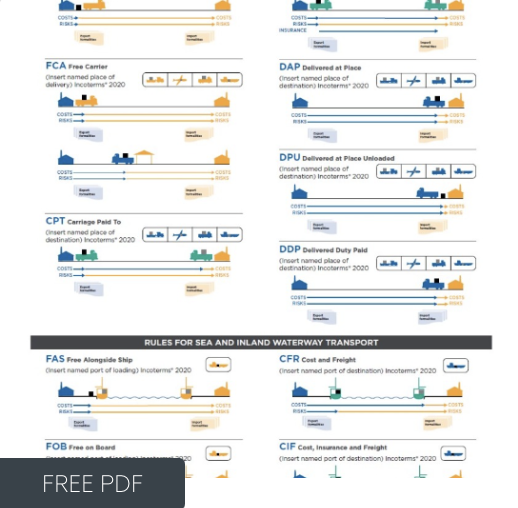Understanding Incoterms: The Essential Guide to International Trade Terminology
Introduction.
In this article, we will look at incoterms definitions and help you understand incoterms meaning. Scroll down for the official free incoterms chart.
What are Incoterms?
The Incoterms (International Commercial Terms) were first created by the International Chamber of Commerce (ICC) in 1936, and they were revised in 1957, 1967, 1980, 1990, 2000, 2010, and most recently, in 2020. The Incoterms provide standard definitions and rules for the interpretation of common trade terms used in international contracts for the sale of goods, including the obligations, risks, and costs associated with the delivery of goods from the seller to the buyer. Businesses and governments worldwide widely use the Incoterms to facilitate international trade and reduce misunderstandings and disputes between parties in different countries.
Why are Incoterms Important for Supply Chain Teams?
Incoterms are helpful to a supply chain team for several reasons:
Clear and Consistent Communication: Incoterms provide standardized definitions of trade terms, which can help to eliminate confusion and misunderstanding between parties in different countries. By using Incoterms, brands and supply chain teams can ensure that their communication is clear and consistent with their trading partners.
Shared Responsibility: Incoterms clearly allocate risks and responsibilities between the seller and buyer. By using Incoterms, brands and supply chain teams can ensure that both parties clearly understand their obligations and liabilities in the transaction.
Reduced Costs and Disputes: Incoterms can help to reduce costs and disputes in international trade. By clarifying the responsibilities of each party, Incoterms can help to avoid misunderstandings, delays, and additional costs that can arise when goods are transported across international borders.
Compliance with International Trade Regulations: Incoterms are recognized by customs authorities and international trade organizations around the world. By using Incoterms, brands and supply chain teams can ensure that they comply with international trade regulations and avoid potential penalties and fines.
The Four Categories of Incoterms
There are 11 incoterms in total, and they can be grouped into four categories: E-terms (Departure), F-terms (Main Carriage Unpaid), C-terms (Main Carriage Paid), and D-terms (Arrival). Each category places a varying degree of responsibility on the seller and buyer during the shipping process.
E-terms (Departure)
E-terms place the most responsibility on the buyer. The seller is only responsible for making the goods available at their premises. The buyer is responsible for everything else, including loading the goods onto the transport vessel, clearing customs, and paying for transportation.
EXW (Ex Works): The seller makes the goods available to the buyer at their premises or another named place, and the buyer is responsible for all costs and risks associated with loading, transport, and delivery of the goods. This is one of the most common incoterms when requesting quotes from suppliers.
F-terms (Main Carriage Unpaid)
F-terms place more responsibility on the seller than the E-terms. The seller is responsible for delivering the goods to the carrier or another party designated by the buyer, but the buyer is responsible for everything else.
FCA (Free Carrier): The seller delivers the goods to a carrier or another named party at a specified place, and the buyer is responsible for all costs and risks from that point onward.
FAS (Free Alongside Ship): The seller delivers the goods to a port of shipment and places them alongside the vessel, but is not responsible for loading the goods onto the vessel or any subsequent transportation.
FOB (Free on Board): The seller delivers the goods on board the vessel at a specified port of shipment, but is not responsible for any subsequent transportation or costs. This is another of the most common incoterms.
C-terms (Main Carriage Paid)
C-terms place even more responsibility on the seller than the F-terms. The seller is responsible for delivering the goods to the carrier or another party designated by the buyer, and they must also pay for the main carriage.
CIP (Carriage and Insurance Paid To): The seller delivers the goods to a carrier or another named party at a specified place and pays for the transportation and insurance to the destination.
CPT (Carriage Paid To): The seller delivers the goods to a carrier or another named party at a specified place and pays for the transportation to the destination.
CFR (Cost and Freight): The seller delivers the goods on board the vessel at a specified port of shipment and pays for the transportation to the destination port, but is not responsible for insurance.
CIF (Cost, Insurance, and Freight): The seller delivers the goods on board the vessel at a specified port of shipment and pays for the transportation and insurance to the destination port.
D-terms (Arrival)
D-terms place the most responsibility on the seller. The seller is responsible for delivering the goods to the buyer at the agreed-upon destination. They must also pay for all costs associated with getting the goods to that destination.
DDP (Delivered Duty Paid): The seller delivers the goods to the buyer at a specified place and is responsible for all costs and risks, including customs duties and taxes, until the goods are delivered to the destination.
DPU (Delivered at Place Unloaded): The seller delivers the goods to the buyer at a specified place and is responsible for all costs and risks until the goods are unloaded at the destination.
DAP (Delivered at Place): The seller delivers the goods to the buyer at a specified place, but is responsible for all costs and risks until the goods are unloaded at the destination.
>Download the official ICC Incoterms<

Conclusion
In conclusion, the Incoterms are a set of standard trade definitions used in international contracts to sell goods. They provide clear rules for interpreting common trade terms, including the obligations, risks, and costs associated with delivering goods from the seller to the buyer. The Incoterms are recognized worldwide and are an essential tool for anyone involved in international trade. By understanding the 11 incoterms and their associated responsibilities, you can ensure that your international transactions go smoothly and avoid misunderstandings, delays, and additional costs that can arise when goods are transported across international borders.
For businesses that want to make international trade transactions effortless, Ravacan software can be a great solution. With Ravacan software, businesses can easily manage their international trade activities and exchange information with their whole supply chain in real time. Our software helps to reduce costs, improve compliance with international trade regulations, and make the entire process of international trade faster and more efficient.
Copyright © 2022 Ravacan | All rights reserved

